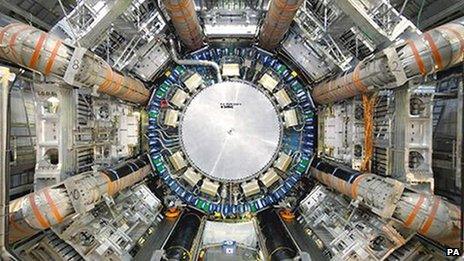Higgs boson discovered. What next for CERN laboratory?
- Published
- comments

The ATLAS experiment at CERN
So once you have spent more than £8bn, external finding the Higgs boson the big question is what do you do next?
For at least one of the major experiments at the CERN laboratory, in Switzerland, that's down to the new person in charge, Professor David Charlton, external from the University of Birmingham.
He is the new official spokesperson, external for the ATLAS experiment, a particle physics experiment at CERN.
A spokesperson at CERN does much more than just talk to the media. (Although you also get to make the big splash when you do discover something. It was the previous spokesperson for ATLAS Professor Fabiola Gianotti, external who jointly made the announcement they'd discovered what turned out to be the Higgs boson.)
But day-to-day the role of the spokesperson is to be the "overall scientific lead" for the ATLAS experiment.
CERN shutdown
But what does that mean for a massive collaborative effort like research at CERN? What does a "scientific lead" actually do? And what do you do for the next two years when CERN will be shut down while it goes through a massive upgrade programme. What do you do when you can't gather any new data?
Well according to Professor Charlton the ATLAS, external team will actually be busier than ever.
The massive ATLAS detector will be opened up and the hardware inside updated and fixed. Scientists from the ATLAS team are still working on the staggering amounts of data that has already been collected and will likely be doing so right up to 2015 when they switch CERN back on again. Finally the shutdown is also a chance to look at the computers that collect the data and tweak the software they use.
Only British spokesperson
So there's plenty to be done and Professor Charlton is now one of the most senior British scientists working at CERN and the only spokesperson for the four major experiments to come from this country.
He is at pains to point out that while he is the man in charge, it is very much a collaborative process. More than 3,000 scientists from 177 institutes in 38 countries work on the ATLAS experiment, as he puts it: "we work by discussions and consensus-building - people need to agree with and support the experiment's goals".
Beyond Higgs the ATLAS experiment will now be looking for evidence of dark matter in the universe and extra dimensions of space. There's still plenty of exciting new physics for CERN to discover and Professor Charlton will be leading arguably its most successful experiment into the future.